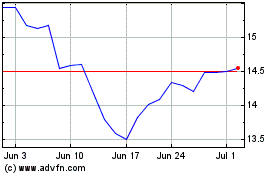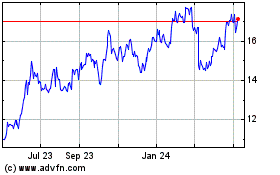By Jeffrey T. Lewis and Rogerio Jelmayer
SÃO PAULO -- For investors flush with cash -- and calm --
Brazil's beatdown assets are looking attractive.
Some of the country's most prominent businesses, including oil
company Petróleo Brasileiro SA and iron mining giant Vale SA, are
selling assets at the cheapest level in years amid an economic and
political meltdown.
These and other Brazilian companies are scrambling to cut debt
through divestment. Petrobras and Vale alone are looking to dump as
much as $20 billion in assets, making Brazil enticing for investors
with the right risk profile.
"Private-equity investors see a country that's good for
long-term investment," said Fernando Borges, managing director and
co-head of private-equity firm The Carlyle Group in Brazil and
South America. "Brazil is a big country, which a big young
population and a big middle class...now could be a good time to get
in."
Vale, the world's biggest iron-ore producer by revenue, has been
hit by the drop in the price of the commodity. The mining company
said in February it would consider selling even core assets to cut
the $25 billion in debt it had at the end of 2015 to $15 billion
within 18 months. That is on top of an existing program to sell $4
billion to $5.5 billion of noncore assets.
Petrobras, which has been hobbled by an epic corruption scandal
and the steep decline in the price of oil, has said it wants to
divest itself of $15 billion in assets by the end of 2016, and
another $42 billion by the end of 2018 in an effort to cut its huge
debt.
The company has put its Argentine unit on the block, along with
some power distribution operations, part of a natural-gas
distribution business and various less-prized oil fields, among
other assets. The broad range of assets for sale is even attracting
some local rivals in better financial shape than the oil
company.
"Petrobras has interesting assets that we're going to take a
look at," said Rubens Ometto, chairman of Cosan SA, a Brazilian
producer of sugar and ethanol. He cited natural gas as an area his
company is eyeing. Brazil has the world's biggest fleet of cars
that can run on either gasoline or ethanol, and Cosan has a joint
venture with Royal Dutch Shell that distributes both fuels around
the country.
But it isn't just big companies that are being forced to sell.
Brazil's economy contracted by 3.8% in 2015 and is expected to
shrink at about the same pace this year.
The brutal downturn has seen a surge of companies seek
bankruptcy protection. In the first quarter alone, 409 Brazilian
companies sought relief, more than double the figure in the same
period a year earlier, according to Serasa Experian.
Companies in financial distress are natural takeover targets.
Brazilian investment banks are seeing a lot of interest from
international investors looking for potential mergers and
acquisitions in Brazil, and activity is likely to accelerate
through the end of the year, according to Alberto Fernandes, vice
president of Itau BBA, the investment banking arm of giant bank
Itau Unibanco Holdings.
The volume of M&A operations in Brazil totaled just 109
billion reais last year, down from 192.7 billion reais in 2014,
according to Brazilian Association of Financial and Capital Market
Institutions, or Anbima.
Investors looking for quick gains should take heed. Even at
today's knockdown prices, many Brazilian assets could take years to
turn a profit given the current turmoil.
"Brazil is for investors who are looking for a return in a
horizon of 10 years," said Martin Escobari, director of Latin
America operations of U.S.-based private-equity firm General
Atlantic. "You have to have the capacity to get through this
period, because there will be a lot of volatility in the next two
years."
The volatility stems from several sources. There is the
Operation Car Wash corruption investigation centered on Petrobras,
which is far from over and still weighing heavily on the nation's
important petroleum and construction sectors.
The economy is foundering, suffering its biggest contraction in
35 years in 2015.
And the impeachment effort against leftist President Dilma
Rousseff is a process that markets have cheered, but which is
unlikely to lead to a quick economic turnaround.
While regime change is in the air, the government's legacy of
meddling in key sectors of Brazil's economy has some investors
still waiting on the sidelines to take the measure of a possible
post-Rousseff government.
A good example is Brazil's ailing electricity sector. Retail
price controls implemented under Ms. Rousseff battered energy
distributors and discouraged some generators from making additional
investments.
Those controls have been lifted but investors remain wary. On
Wednesday, Brazil's government tried to auction 24 concession
contracts for transmission lines; it received bids on only 14.
Government interference has created "serious doubts" about the
stability of Brazil's regulatory framework, according to Alexandre
Furtado, an analyst at Lopes Filho & Associados in Rio de
Janeiro.
Write to Jeffrey T. Lewis at jeffrey.lewis@wsj.com and Rogerio
Jelmayer at rogerio.jelmayer@wsj.com
(END) Dow Jones Newswires
April 15, 2016 15:35 ET (19:35 GMT)
Copyright (c) 2016 Dow Jones & Company, Inc.
Petroleo Brasileiro ADR (NYSE:PBR)
Historical Stock Chart
From Mar 2024 to Apr 2024

Petroleo Brasileiro ADR (NYSE:PBR)
Historical Stock Chart
From Apr 2023 to Apr 2024
